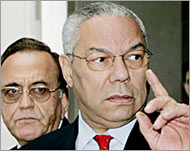UN Iraq resolution edges towards agreement
The draft UN resolution on the 30 June handover of power in Iraq is slowly moving towards consensus ahead of a security council vote.

The US, which is co-sponsoring the resolution with the UK, wants the security council to vote on the measure on Tuesday
Earlier US efforts to put the finishing touches on the draft appeared to have hit a snag with Russia maintaining it still had reservations.
But later on Monday Russia’s Deputy Foreign Minister, Yuri Fedotov, hailed an amended resolution as a great improvement on earlier drafts.
“The Security Council draft resolution has been really improved,” Fedotov told Russia’s First Channel television.
“It reflects proposals from Russia, France, Germany, China and other Security Council members.”
And in Paris, Prime Minister Jean-Pierre Raffarin said on Monday that France believes negotiations on the draft are heading towards a conclusion, but it still needs a number of adjustments.
“We are on the way to closing this subject. There are still a number of important points regarding the sovereignty of the Iraqi people to which France is very attached. There are still a number of points to finalise,” Raffarin told LCI television.
“There is a consensus emerging around France’s positions. That is why the resolution is evolving in the right direction. We want to see it evolve a little further. That way it will be acceptable to all and really meet our wishes,” Raffarin said.
Final piece
The US resolution marks virtually the final piece in the puzzle for the transfer of power more than a year after the invasion began that ousted Saddam Hussein.
The council on Sunday discussed letters from US Secretary of State Colin Powell and Iraqi Prime Minister Iyad Allawi pledging that Baghdad and the multinational force will cooperate on any military actions.
The relationship between the force and the government in Baghdad had been a sticking point in earlier council talks on the resolution, which is co-sponsored by Britain.
Allawi and Powell, in separate letters, called for broad Iraqi control over its own security and pledged to reach agreement over sensitive military operations.
More changes are expected to the draft on Monday after a briefing by UN envoy Lakhdar Ibrahimi, who helped form an interim Iraqi government to take power after the US-led occupation ends officially on 30 June.
Virtual veto
The letters from Allawi and Powell will be attached to the resolution that would endorse an interim Iraqi government to take office on 30 June and authorise a US-led multinational force to “use all necessary means” to keep the peace.
 |
|
Powell (R) insists the US would |
But France proposed an amendment that gives Iraq a virtual veto over US-led “sensitive offensive operations” during a closed-door special council session on Sunday.
In his letter, Allawi said he would chair a ministerial committee for national security, in which the US command would participate. He said this group needed to “reach agreement on the full range of fundamental security and policy issues, including policy on sensitive offensive operations.”
Allawi said that his government would establish a national security committee and invite MNF commanders to “attend and participate,” and he asked the Security Council to act now to pass the resolution.
“Until we are able to provide security for ourselves, including the defence of Iraq’s land, sea and air space, we ask for the support of the Security Council and the international community in this endeavour,” Allawi wrote.
‘Sovereignty’
Powell said in his letter the US command would “work to reach agreement on the full range of fundamental security and policy issues, including policy on sensitive offensive operations” in partnership with the Iraqis.
 |
|
The US would continue to have |
US Ambassador Negroponte said the letters clearly showed “the full sovereignty” of Iraq was being respected.
He said they established a mechanism “to include the fullest possible coordination between Iraqi government on one hand and multinational force on the other, including on policy towards sensitive offensive operations.”
Britain’s UN ambassador, Emyr Jones Parry, was more categorical. He said his government understood that “the policy on sensitive offensive operations will require the assent of a (new Iraqi) ministerial committee.”
Nevertheless, Algeria’s UN Ambassador Abd Allah Baali, who backed the French amendment, said the intent of the letters “had to be reflected in the resolution itself, in a separate paragraph so we need to have an answer to this last concern.”
Right to imprison
Germany, China, Chile and Brazil also spoke in favour of the French proposal in varying degrees, diplomats said.
Powell made clear the US military still would have the right to jail Iraqis, despite an outcry in Iraq and around the world over abuse of Iraqi prisoners in US-run jails.
His letter says the US military could intern suspects “where this is necessary for imperative reasons of security …”
The United States and the UK revised their resolution for the third time in less than two weeks on Friday.
The latest draft also tightened up language making it clear the mandate of the force would expire in January 2006, when a permanent Iraqi government is expected to take office.